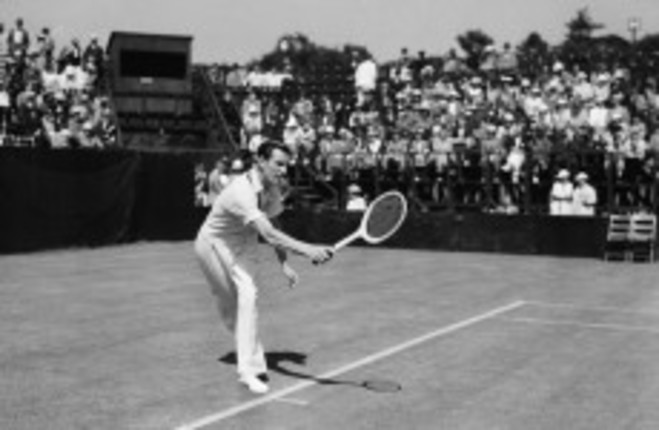IF ANDY MURRAY becomes Britain’s first Wimbledon men’s champion in 77 years on Sunday he’ll pocket a cheque for $2.4 million and will probably be feted as a future knight of the realm.
But when Fred Perry, the country’s last champion, won his third and final Wimbledon title in 1936, the victory was received with muted praise and ongoing suspicion of the brash, self-confident northerner.
One year later, he turned professional and headed for Hollywood where he dated movie sirens, Marlene Dietrich, Jean Harlow and Loretta Young and played tennis at the Beverly Hills Club with Charlie Chaplin and Groucho Marx.
Perry and stifling, pre-war Britain were never the best of friends.
When Perry, the son of a Stockport trade unionist and cotton factory worker, won his first Wimbledon in 1934 by beating Australia’s Jack Crawford, he heard a Wimbledon committee official telling his vanquished opponent, ‘This was one day when the best man didn’t win’.
“I just couldn’t believe it,” Perry told biographer, Ronald Atkin.“I’d already beaten Crawford in the US and Australian finals. And do you know what happened after that? As champion I was due an All England Club tie. No one presented it to me. No one shook my hand or said: ‘Congratulations’.
“They just strung it over my chair in the locker-room without a word.”
Perry never forgave the All England Club and after he headed to the United States, he renounced his British citizenship and even served in the US air force in World War II.
“I deeply resented not being accepted by officialdom at home,” Perry told Atkin.
“I was from the North Country rather than old-school-tie country. I always had the feeling I was tolerated but not really wanted. I had forced my way in. I was simply never part of the establishment end of British tennis — so there was always a rough edge when we were in contact.”
In another biography, The Last Champion, author Jon Henderson wrote that Perry, who would marry four times, thrived in egalitarian America.
“He was an extremely good looking, red-blooded lad. The girls liked him and he liked the girls, it went from there,” wrote Henderson.
“One US columnist said ‘women fell for him like ninepins and when he went to Hollywood, male film stars went and sulked in Nevada’.”
By the time of Perry’s death at the age of 85 in 1995, he had finally become accepted into the British tennis culture.
“Fred Perry was a superlative ambassador for our sport throughout the world. He was a great character, big-hearted and a true champion in every sense,” said former All England chairman John Curry.“He won the affection and admiration of all those involved in tennis — the players, the fans, the media, and officials. Fred was one of those rare individuals. He was at ease with all – from the youngest fans to royalty.”
Perry’s third Wimbledon triumph in 1936 was achieved with breathtaking speed, his 6-1, 6-1, 6-0 victory over Germany’s Baron Gottfried von Cramm taking only 40 minutes.
Von Cramm’s life, too, had its controversy — he was imprisoned for homosexuality for six months in 1938 and died in a car crash in Cairo in 1976.
Murray can’t escape the shadow of Perry, but is making light of the comparisons.
When asked what he thought Perry might say to him if they had had the chance to meet, Murray replied: “Why are you not wearing my kit?”

